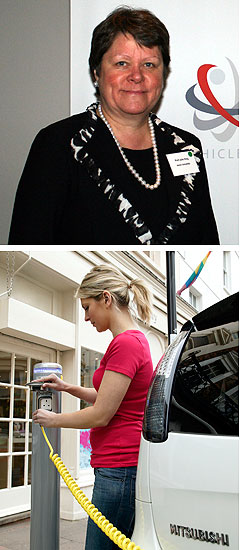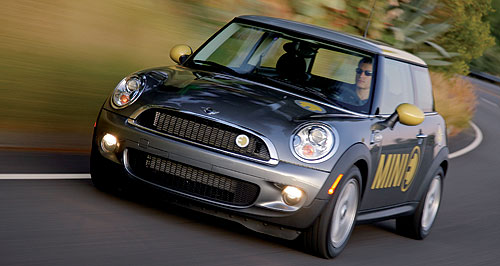Make / Model Search
News - General News - Electric VehiclesMany EV fears unfounded, says UK expertRange anxiety?: A Berlin pilot program involving 50 electric Mini E cars showed that drivers went further each day on average than those driving similar cars with conventional engines. Pilot studies show EV owners shrug off range anxiety to drive further than others7 Jul 2011 REAL-world electric vehicle (EV) trials in Germany and Britain are turning many assumptions on their heads, Britain’s leading authority on low-carbon transport, Professor Julia King, revealed in Melbourne this week. Prof King, who led the British government’s landmark research into the transition to green motoring at the request of then chancellor of the exchequer Gordon Brown, said a Berlin pilot program involving 50 electric Mini E cars showed the drivers went further each day on average than those driving similar cars with conventional engines, despite the preconception of “EV range anxiety”. The studies also found that EV drivers tended to shun public recharging points, preferring to recharge the batteries at home or work, challenging the belief that large sums need to be spent on public infrastructure to handle EVs, especially where most people live in homes with off-street parking. And while the drivers in the trials initially started charging their cars every day to make sure the batteries were topped-up, after the first month they were more relaxed about it, only charging the car every few days and letting their batteries run to low levels without fretting about it. Prof King, vice-chancellor of Aston University in Birmingham, was speaking in Melbourne at a forum for the Electric Vehicle Alliance, a fledgling new peak body for Australian stakeholders in the EV industry formed to address issues concerning the introduction of EVs in Australia.  Left: Professor Julia King. Left: Professor Julia King.A former aeronautical engineer for Roll-Royce Aerospace, Prof King was the lead author of the King Review of Low Carbon Cars – the report on which the UK government has based its strategy for addressing greenhouse gas emissions from transport to help the nation achieve a 90 per cent cut in carbon emissions by 2050 compared with 1990. She told the Melbourne forum – held in conjunction with the Australian International Motor Show – that the only way the UK could achieve its transport greenhouse targets was by switching to EVs run on low-carbon electricity. She said the world motor vehicle fleet – currently about one billion cars and trucks – would at least double by 2030 and probably triple by 2050, not just due to demand from new middle-class and wealthy masses in China and India but continuing growth in Europe and elsewhere. That growth meant that the reduction of CO2 emissions per vehicle would have to be far greater per car to reverse the global upward CO2 trend. Prof King said behavioural changes – a switch to best-practice cars, a focus on ‘eco driving’ and lower speed limits – could cut vehicle emissions by up to 50 per cent, although the UK climate change committee was working on an assumption of a 20 per cent reduction. She said the UK’s current average CO2 emissions per car was 170 grams per kilometre, and for new cars it was 144g/km (Australia’s is 212.6g/km). Even with best-scenario cuts delivered by behavioural changes and gains in conventional engine technology, vehicles would fall well short of CO2 targets required for greenhouse mitigation. “About 70-80g/km is considered the best we will ever get from an internal combustion engine – that’s about where the technology runs out,” she said. “But we need a 90 per cent reduction in per kilometre emissions, so we need to take 144g/km down to 14g/km by 2050,” she said. “Electric vehicles with a de-carbonised electricity system are about the only technology we can see today that is going to deliver that kind of scale of change.” Prof King said based on the current carbon emissions of UK electricity generation, current EVs had a slightly better ‘emissions’ than the best internal-combustion engine cars such as the Toyota Prius. But she said Britain planned to reduce CO2 emissions from electricity generation over the next several decades, which would cut the EV footprint. Prof King said the UK had set a target of 1.7 million EVs and plug-in hybrids by 2020 to put it on track for its 90 per cent CO2 reduction target. She said modeling by her team in the UK predicted that EVs would become economically viable for regular motorists between 2015 and 2018, depending on fuel price, carbon price and the rate of the reduction in the cost of batteries. “I have been enormously surprised in the past three years alone how fast battery costs appear to have been falling,” she said. Prof King said pilot schemes such as trial of 340 EVs in the UK and 50 electric Mini E cars in Berlin was shedding new light on use of EVs on public roads. “In Berlin, they compared 50 Mini E drivers with 50 standard Minis and BMW 1 Series, and they discovered their Mini E drivers actually drove further on average every day than their internal combustion engine vehicle drivers,” she said. “They (Mini Es) have a 200km range, which for 90 per cent of them quite satisfactory. “They didn’t like public charging infrastructure. In fact, the majority of them never used public charging infrastructure. They liked to charge at home and at work. “And once they had their vehicles for a month, they didn’t plug them in every time they stopped. “Perhaps surprisingly, they only plugged in their vehicles every few days, so they became very confident with running their vehicles down to very low levels of charge.” Prof King said that until now, it had been assumed the cost of public EV recharging infrastructure in the UK could be anything from 150 million to 1.5 billion, but the new data suggested it might now be towards the lower end of the scale. “The real infrastructure challenge now in the UK is avoiding spending too much money on it,” she said. However, cities such as London where people tended not to have off-street parking would require a higher level of charging posts. Prof King said a lot of people thought EVs would be a disaster for the electricity system, but even if all 30 million cars on UK roads switched over to electricity, they would consume only 12 per cent of generation capacity. “It will be a long time before we can even think about having 30 million electric cars in the UK – it might well be 2040 before we got there,” she said. “It gives us a bit of time to address the electricity system, and even the target for 2020, which is 1.7 million EVs on our streets, is about one per cent of our current electricity usage. “If we haven’t managed to solve that problem in the next ten years we might as well give up now.” Prof King said the dip in electricity demand at night in the UK freed up sufficient capacity to charge 20 million EVs. However, she said ageing transformers on the grid would have to be upgraded to handle the load “if we all come home and plug in at once”. Prof King said that while western countries had built several thousands of EVs to date, China had made hundreds of millions of electric bicycles. “It would not be a long path to get around that curve to building millions of electric vehicles,” she said. “So I think there is good reason for us to get on with it we have to start dealing with them now. “This is a competition, and if we want the economic benefits of being part of the new industry, we do need to get off our backsides and we need the government support if we want the early markets. “By 2030, need 60 per cent of new-car sales to be plug-in hybrids or electric vehicles, so we have a rapid increase in numbers that were are going to need to be delivering.”  Read more |
Click to shareGeneral News articlesResearch General News Motor industry news |










Facebook Twitter Instagram